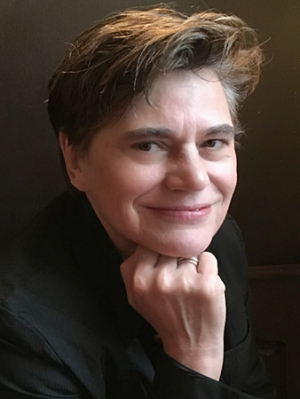Gallery
All Pictures (3)Biography
Bettina Böhler, born in Freiburg on 24th June 1960, first got in touch with the film industry during an internship at a film laboratory in 1979. Subsequently, she was working as a cutter for dubbing in Berlin and was assistant to film productions of Helma Sanders-Brahms, Rudolf Thome and Ulrike Ottinger.
In 1985, she got her first credit as editor for "Du mich auch" by Helmut Berger, Anja Franke and Dani Levy. In the following years, Böhler made herself a name as one of the most versed editors in German cinema. Her spectrum covers poetic, slow art cinema like "Novalis - Die blaue Blume" (1993) as well as wildly edited trash art such as Christoph Schlingensief's "Die 120 Tage von Bottrop" (1997). Since 1991, she has been teaching editing at the Deutsche Akademie für Film und Fernsehen Berlin.
She has also established long-term collaborations with a number of filmmakers. With Michael Klier, she has worked on "Überall ist es besser, wo wir nicht sind" ("The Grass is Greener Everywhere Else", 1989), "Ostkreuz" (1991), "Heidi M." (2001) and "Farland" (2004). For Angela Schanelec, she edited "Plätze in Städten" ("Places in Cities", 1998), "Marseille" (2004) and "Nachmittag" ("Afternoon", 2007) among others. Since 2005, she has also been editing almost all of the films of her partner, Angelina Maccarone, among them the award-winning love drama "Verfolgt" ("Hounded", 2006) and the controversial "Wem Ehre gebührt" (2007), an episode of the long-running German TV crime series "Tatort". Additionally, she has collaborated several times with directors so different in style as Henner Winckler ("Klassenfahrt" / "School Trip", 2002; "Lucy", 2006) and Oskar Roehler ("Lulu und Jimi", 2009; "Jud Süss - Film ohne Gewissen" / "Jew Suss - Rise and Fall", 2010).
Most commonly however, the name Bettina Böhler is associated with Christian Petzold. Böhler had met Petzold though Michael Klier and started working with him in 1996 for the TV film "Cuba Libre". She won a number of awards for editing the highly appraised family drama "Die innere Sicherheit" ("The State I Am In", 2000) and she has edited Petzold’s films "Toter Mann" ("Something to Remind Me", 2001), "Wolfsburg" (2002), "Gespenster" ("Ghosts", 2005), "Yella" (2007, Femina Award at the Berlinale 2007) and "Jerichow" (2008).
In 2012, Böhler received a Deutscher Filmpreis nomination for her work on "Barbara" (2012) and won the Preis der deutschen Filmkritik (German Film Critics Association Awards) for the same film. At the Toronto Film Festival 2012, Margarethe von Trotta's "Hannah Arendt" premiered. Director Thomas Arslan hired her to edit his Western "Gold", which premiered at the Berlinale 2013.
The long-term documentary film "Das Gelände" ("Wasteland", 2014), the love film "Patong Girl" (DE/TH 2014), Margarethe von Trotta's "Die abhandene Welt" ("The Misplaced World", 2015) as well as Christian Petzold’s post-war melodrama "Phoenix" (2014) and his "Tatort" episodes "Kreise" (2015, TV) and "Wölfe" (2016, TV) are other important works of Böhler. For Daniel Harrich she edited the much-noticed, investigative TV film "Meister des Todes" (2015).
In 2017, Böhler received another nomination for the Deutscher Filmpreis for her work on Nicolette Krebitz' highly-acclaimed film "Wild" (2015) and in the same year, Valeska Grisebach’s character study "Western" (2017) celebrated its premiere in the competition of the Cannes Film Festival.
For Margarethe von Trotta's documentary "Auf der Suche nach Ingmar Bergman" ("Searching for Ingmar Bergman", DE/FR 2018) Böhler was not only editing but also co-directing. As an editor she worked with director Christian Petzold again for the feature film "Transit" (2018) and the episode "Tatorte" (2018) of the popular German crime series "Polizeiruf 110". Böhler also edited Sherry Hormann's award-winning drama "Nur eine Frau" ("A Regular Woman", 2019) about a German-Turkish woman, who is threatened and eventually murdered by her brothers for trying to lead a self-determined life.
In the Panorama section of the 2020 Berlinale, Bettina Böhler presented her first solo directorial work: the documentary "Schlingensief - In das Schweigen hineinschreien" ("Schlingensief – A Voice that Shook the Silence"). Her portrait of the late artist received several awards: the film won the Bavarian Film Award in 2020 and was nominated for both Best Documentary and Best Editing at the German Film Awards. Böhler's editing work was further recognized in 2021 with honors from the German Camera Award and Edimotion.
Following this successful debut, Böhler took on the editing of Lisa Bierwirth's "Le Prince" (2021), an intercultural love story. Her work on Nicolette Krebitz's romantic comedy "A E I O U - Das schnelle Alphabet der Liebe" ("A E I O U – A Quick Alphabet of Love," DE/FR 2022) earned her yet another nomination for the German Film Award.
In the years that followed, Böhler edited Hanna Slak's intimate drama about a mother and son, "Kein Wort" ("Not a Word," 2023); Ulrike Kofler's award-winning family portrait "Gina" (AT 2024); and two more films by Christian Petzold: the subtly humorous character study "Roter Himmel" ("Afire," 2023) and the drama "Miroirs No. 3", which premiered at the Cannes Film Festival in 2025.
